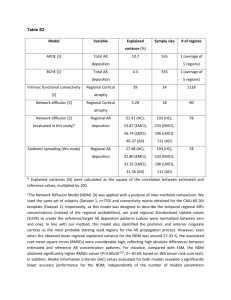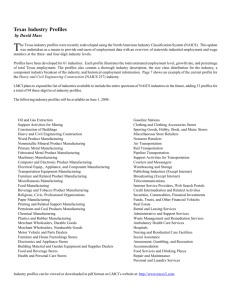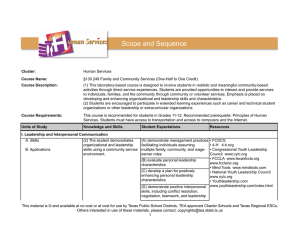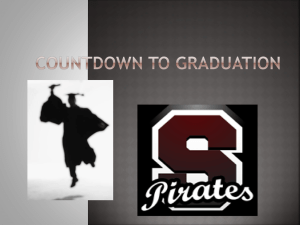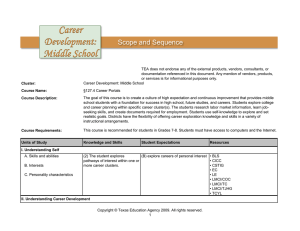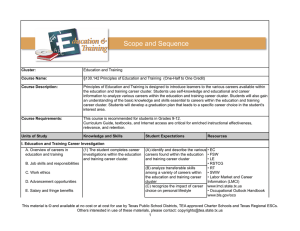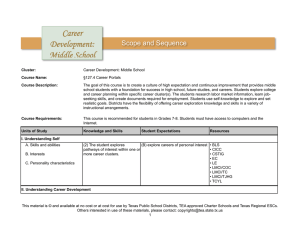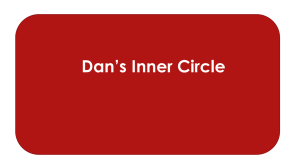Career Development: Middle School Scope and Sequence
advertisement
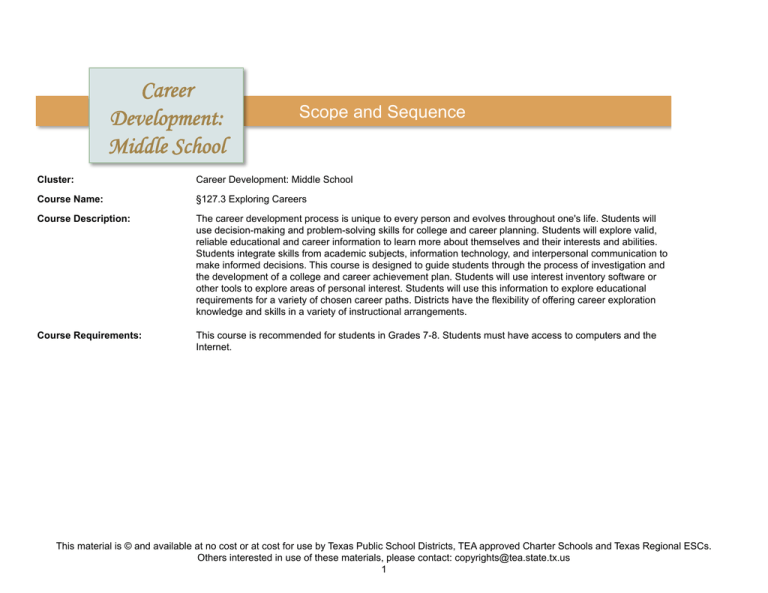
Career Development: Middle School Scope and Sequence Cluster: Career Development: Middle School Course Name: §127.3 Exploring Careers Course Description: The career development process is unique to every person and evolves throughout one's life. Students will use decision-making and problem-solving skills for college and career planning. Students will explore valid, reliable educational and career information to learn more about themselves and their interests and abilities. Students integrate skills from academic subjects, information technology, and interpersonal communication to make informed decisions. This course is designed to guide students through the process of investigation and the development of a college and career achievement plan. Students will use interest inventory software or other tools to explore areas of personal interest. Students will use this information to explore educational requirements for a variety of chosen career paths. Districts have the flexibility of offering career exploration knowledge and skills in a variety of instructional arrangements. Course Requirements: This course is recommended for students in Grades 7-8. Students must have access to computers and the Internet. This material is © and available at no cost or at cost for use by Texas Public School Districts, TEA approved Charter Schools and Texas Regional ESCs. Others interested in use of these materials, please contact: copyrights@tea.state.tx.us 1 Units of Study Knowledge and Skills Student Expectations Resources A. Introduction to career clusters (1) The student explores personal interests and aptitudes as they relate to education and career planning. (B) explore the career clusters as defined by the U.S. Department of Education • EC • FSW • LMCI/CAE • LMCI/CCDVS • LMCI/CIN • LMCI/COC • LMCI/CSN • SWW • TCYL • Achieve Texas www.achievetexas.org • Career Clusters www.careerclusters.org • Vocational Information Center www.khake.com/page2.html B. Portfolio (A) create a personal career portfolio I. World of Work (2) The student analyzes personal interests and aptitudes regarding education and career planning. (3) The student analyzes college and career opportunities. C. Career awareness • BLS • CF • LMCI/CIN • LMCI/COC • LMCI/CSN (A) determine academic • requirements for transition from one Quintessential Careers www.quintcareers.com/job_search_ learning level to the next portfolio.html • Teacher Tap www.eduscapes.com/ tap/topic82.htm (1) The student explores personal interests and aptitudes as they relate to education and career planning. (B) explore the career clusters as defined by the U.S. Department of Education (4) The student evaluates skills for personal success. (F) identify skills that can be transferable among a variety of careers • CF • CSCC • CSTIG • CTSOs • EC • FSW • LE • LMCI/COC • TCYL This material is © and available at no cost or at cost for use by Texas Public School Districts, TEA approved Charter Schools and Texas Regional ESCs. Others interested in use of these materials, please contact: copyrights@tea.state.tx.us 2 Units of Study Knowledge and Skills Student Expectations D. Decision making process I. World of Work (4) The student evaluates skills for personal success. (C) use a problem-solving model and critical-thinking skills to make informed decisions Resources • BLS • CF • CSCC • CSTIG (D) use effective time-management • CTSOs and goal-setting strategies • EC • FSW • LE • LMCI/COC • LMCI/CIN • LMCI/CSN • SWW • TCYL This material is © and available at no cost or at cost for use by Texas Public School Districts, TEA approved Charter Schools and Texas Regional ESCs. Others interested in use of these materials, please contact: copyrights@tea.state.tx.us 3 D. Decision making process Units of Study Knowledge and Skills I. World of Work (2) The student analyzes personal interests and aptitudes regarding education and career planning. (3) The student analyzes college and career opportunities. • BLS • CF • CSCC • CSTIG • CTSOs Student Expectations Resources • EC (C) develop and analyze tables, • FSW charts, and graphs related to career • LE interests • LMCI/COC • LMCI/CIN • LMCI/CSN (A) determine academic • requirements for transition from one SWW • TCYL learning level to the next (E) demonstrate decision-making skills related to school and community issues, programs of study, and career planning E. Workplace basic skills (7) The student develops skills for professional success. F. How things have changed (2) The student analyzes personal interests and aptitudes regarding education and career planning. (7) The student develops skills for professional success. (E) explore and model characteristics necessary for professional success such as work ethics, integrity, dedication, perseverance, and the ability to interact with a diverse population • CF • CSCC • CSTIG • CTSOs • EC • LE • LMCI/BNWB • LMCI/COC • LMCI/SW • SWW • The Career Key www.careerkey.org/asp/career_ development/foundation_skills.asp • Vocational Information Center Skills www.khake.com/page3.html (C) develop and analyze tables, • CF charts, and graphs related to career • EC interests • LE • LMCI/COC • LMCI/STC (A) demonstrate effective verbal, • LMCI/CSN nonverbal, written, and electronic • LMCI/CIN communication skills • LMCI/PPI • SWW This material is © and available at no cost or at cost for use by Texas Public School Districts, TEA approved Charter Schools and Texas Regional ESCs. Others interested in use of these materials, please contact: copyrights@tea.state.tx.us 4 Units of Study Knowledge and Skills Student Expectations Resources G. Post-secondary options in I. World of Work high school (3) The student analyzes college and career opportunities. (B) explore opportunities for earning college credit in high school such as advanced placement courses, International Baccalaureate courses, dual credit, and local and statewide articulated credit • LMCI/COC • LMCI/CIN • Local District Resources • Local High School course catalog • TechPrep www.techpreptexas.org (E) demonstrate decision-making skills related to school and community issues, programs of study, and career planning II. Personality, Interest, and Aptitude Assessments A. Completion of personal assessments (1) The student explores personal interests and aptitudes as they relate to education and career planning. (A) complete, discuss, and analyze • ASVAB Career Exploration the results of personality, career Program interest, and aptitude assessments www.asvabprogram.com • TexasCARES www.lmci.state.tx.us/ shared/cares.asp • Texas OSCAR - Occupation and Skill Computer Assisted Researcher www.ioscar.org/tx B. Review of results (1) The student explores personal interests and aptitudes as they relate to education and career planning. (A) complete, discuss, and analyze • ASVAB Career Exploration the results of personality, career Program interest, and aptitude assessments www.asvabprogram.com • TexasCARES www.lmci.state.tx.us/shared/cares.a (C) develop and analyze tables, sp charts, and graphs related to career • Texas OSCAR - Occupation and interests Skill Computer Assisted Researcher www.ioscar.org/tx (2) The student analyzes personal interests and aptitudes regarding education and career planning. C. Analysis of labor market information (5) The student recognizes the (B) use appropriate resources to impact of career choice on personal compare and contrast salaries and lifestyle. educational requirements of at least three careers in the student's interest area • EC • LMCI/CCDVS • LMCI/LOACT • Achieve Texas www.achievetexas.org • Career Clusters This material is © and available at no cost or at cost for use by Texas Public School Districts, TEA approved www.careerclusters.org Charter Schools and Texas Regional ESCs. Others interested in use of these materials, please contact: copyrights@tea.state.tx.us • Labor Market and Career 5 Information www.lmci.state.tx.us C. Analysis of labor market information Units of Study Knowledge and Skills I. World of Work (1) The student explores personal interests and aptitudes as they relate to education and career planning. • EC • LMCI/CCDVS • LMCI/LOACT • Achieve Texas www.achievetexas.org Student Expectations Resources • Career Clusters (C) summarize the career www.careerclusters.org opportunities in a cluster of • Labor Market and Career personal interest Information (D) research current and emerging www.lmci.state.tx.us fields related to personal interest • Occupational Outlook Handbook areas www.bls.gov/oco (E) determine academic requirements in career fields related • O*Net online.onetcenter.org • TexasCARES to personal interest areas www.lmci.state.tx.us/ (F) explore how career choices shared/cares.asp impact the balance between • Texas OSCAR - Occupation and personal and professional Skill Computer Assisted Researcher responsibilities www.ioscar.org/tx (G) research educational options • U.S. Bureau of Labor Statistics and requirements using appropriate www.bls.gov technology This material is © and available at no cost or at cost for use by Texas Public School Districts, TEA approved Charter Schools and Texas Regional ESCs. Others interested in use of these materials, please contact: copyrights@tea.state.tx.us 6 Units of Study Knowledge and Skills D. Post-secondary assessments (3) The student analyzes college I. World of Work and career opportunities. Student Expectations Resources (C) develop an awareness of financial aid, scholarships, and other sources of income to support postsecondary education • LMCI/COC • LMCI/CSN • LMCI/CYC • The ACT www.actstudent.org/college/index.ht ml • ASVAB Career Exploration Program www.asvabprogram.com • College Board www.collegeboard.com • TechPrep www.techpreptexas.org (F) identify how performance on assessments such as the SAT®, ACT®, ASVAB®, and ACCUPLACER® impact personal academic and career goals III. Career Cluster Project A. Research (1) The student explores personal interests and aptitudes as they relate to education and career planning. (B) explore the career clusters as defined by the U.S. Department of Education • EC • FSW • LMCI/CAE • LMCI/CCDVS (C) summarize the career • LMCI/CIN opportunities in a cluster of • LMCI/COC personal interest • LMCI/CSN (D) research current and emerging • SWW fields related to personal interest • TCYL areas • Achieve Texas (G) research educational options www.achievetexas.org and requirements using appropriate • Career Clusters technology www.careercluster.org (2) The student analyzes personal (C) develop and analyze tables, • Occupational Outlook Handbook interests and aptitudes regarding charts, and graphs related to career www.bls.gov/oco education and career planning. interests • O*Net online.onetcenter.org • Entrepreneur.com (E) identify entrepreneurial www.entrepreneur.com opportunities within a field of • Mind Tools www.mindtools.com personal interest • TexasCARES (3) The student analyzes college (A) determine academic www.lmci.state.tx.us/ and career opportunities. requirements for transition from one shared/cares.asp learning level to the next • Texas OSCAR - Occupation and Skill Computer Assisted Researcher www.ioscar.org/tx This material is © and available at no cost or at cost for use by Texas Public School Districts, TEA approved Charter Schools and Texas Regional ESCs. • Vocational Information Center Others interested in use of these materials, please contact: copyrights@tea.state.tx.us www.khake.com/page2.html 7 Units of Study (3) The student analyzes college and career opportunities. Knowledge and Skills Student Expectations (E) demonstrate decision-making skills related to school and community issues, programs of study, and career planning I. World of Work (4) The student evaluates skills for personal success. www.entrepreneur.com • Mind Tools www.mindtools.com • TexasCARES www.lmci.state.tx.us/ shared/cares.asp •Resources Texas OSCAR - Occupation and Skill Computer Assisted Researcher www.ioscar.org/tx • Vocational Information Center www.khake.com/page2.html (D) use effective time-management and goal-setting strategies (5) The student recognizes the (B) use appropriate resources to impact of career choice on personal compare and contrast salaries and lifestyle. educational requirements of at least three careers in the student's interest area (C) evaluate at least three career interests based on budget and salary expectations B. Presentations (7) The student develops skills for professional success. (F) complete activities using projectand time-management techniques (2) The student analyzes personal interests and aptitudes regarding education and career planning. (B) make oral presentations that fulfill specific purposes, using appropriate technology (7) The student develops skills for professional success. (A) demonstrate effective verbal, nonverbal, written, and electronic communication skills • Mind Tools www.mindtools.com IV. Budget and Personal Money Management A. Building a budget (5) The student recognizes the impact of career choice on personal lifestyle. (A) prepare a personal budget reflecting the student's desired lifestyle (B) use appropriate resources to • EC • FSW • LE compare and contrast salaries and • LMCI/COC educational requirements of at least • SWW • TCYL three careers in the student's • Dictionary of Occupational Titles interest area (C) evaluate at least three career www.occupationalinfo.org • Occupational Outlook Handbook interests based on budget and www.bls.gov/oco salary expectations • O*Net online.onetcenter.org • Reality Check www.lmci.state.tx.us/ This material is © and available at no cost or at cost for use by Texas Public School Districts, TEA approved Charter Schools andrealitycheck Texas Regional ESCs. Others interested in use of these materials, please contact: copyrights@tea.state.tx.us 8 Units of Study Knowledge and Skills Student Expectations I. World of Work (1) The student explores personal interests and aptitudes as they relate to education and career planning. (F) explore how career choices impact the balance between personal and professional responsibilities (2) The student analyzes personal interests and aptitudes regarding education and career planning. (C) develop and analyze tables, charts, and graphs related to career interests B. Lifestyle goals C. Alternative career options ("Plan B") (5) The student recognizes the (A) prepare a personal budget impact of career choice on personal reflecting the student's desired lifestyle. lifestyle (1) The student explores personal interests and aptitudes as they relate to education and career planning. (F) explore how career choices impact the balance between personal and professional responsibilities (1) The student explores personal interests and aptitudes as they relate to education and career planning. (F) explore how career choices impact the balance between personal and professional responsibilities • SWW • TCYL • Dictionary of Occupational Titles www.occupationalinfo.org • Occupational Outlook Handbook www.bls.gov/oco Resources • O*Net online.onetcenter.org • Reality Check www.lmci.state.tx.us/ realitycheck • CF • EC • FSW • LE • LMCI/COC • TCYL • SWW • Reality Check www.lmci.state.tx.us/ realitycheck • EC • LMCI/CIN • LMCI/COC • LMCI/CSN • LMCI/LOACT (5) The student recognizes the (B) use appropriate resources to • LMCI/WST impact of career choice on personal compare and contrast salaries and • Dictionary of Occupational Titles lifestyle. educational requirements of at least www.occupationalinfo.org three careers in the student's • Labor Market and Career interest area Information (C) evaluate at least three career www.lmci.state.tx.us interests based on budget and • Occupational Outlook Handbook salary expectations www.bls.gov/oco • O*Net online.onetcenter.org • Texas CARES www.lmci.state.tx. us/shared/cares.asp D. Banking options (6) The student demonstrates an (A) compare the advantages and • EC 1. Savings understanding of personal financial disadvantages of different types of • FSW 2. Checking management. banking services • LE 3. Money market savings • LMCI/COC 4. 401K • LMCI/SW 5. College savings • SWW This material is © and available at no cost or at cost for use by Texas Public School Districts, TEA approved Charter Schools and Texas Regional ESCs. • Family Economics & Financial Others interested in use of these materials, please contact: copyrights@tea.state.tx.us Education www.fefe.arizona.edu 9 • FDIC - Money Smart for Young Adults www.fdic.gov/consumers/ D. Banking options 1. Savings 2. Units ofChecking Study 3. Money market savings I. World of Work 4. 401K 5. College savings E. Balancing a checkbook F. Credit cards G. Retirement savings (6) The student demonstrates an understanding of personal financial management. Knowledge and Skills Student Expectations • EC • FSW •Resources LE • LMCI/COC (B) simulate opening and • LMCI/SW maintaining different types of bank • SWW accounts (C) simulate different methods of • Family Economics & Financial withdrawals and deposits Education www.fefe.arizona.edu • FDIC - Money Smart for Young (D) reconcile bank statements, Adults www.fdic.gov/consumers/ including fees and services consumer/moneysmart/young.html (3) The student analyzes college (C) develop an awareness of • Hands On Banking Program and career opportunities. financial aid, scholarships, and www.handsonbanking.org/en other sources of income to support • Jump$tart www.jumpstart.org postsecondary education • NEFE High School Financial (6) The student demonstrates an (C) simulate different methods of Planning Program understanding of personal financial withdrawals and deposits hsfpp.nefe.org/home management. (D) reconcile bank statements, including fees and services (6) The student demonstrates an (A) compare the advantages and understanding of personal financial disadvantages of different types of management. banking services (B) simulate opening and maintaining different types of bank accounts (A) compare the advantages and (6) The student demonstrates an understanding of personal financial disadvantages of different types of management. banking services V. Workplace Basics A. Modeling workplace basics skills (4) The student evaluates skills for personal success. (A) implement effective study skills • BLS for academic success • BNWB • CF (B) use interpersonal skills to • CSCC facilitate effective teamwork • CSTIG (C) use a problem-solving model • CTSOs and critical-thinking skills to make • EC informed decisions • FSW (D) use effective time-management • LE • LMCI/COC and goal-setting strategies • LMCI/SW (E) effectively use information and • SWW communication technology tools • The Career Key www.careerkey.org/ This material is © and available at no cost or at cost for use by Texas Public School Districts, TEA approved Charter Schools and Texas Regional ESCs. asp/career_development/foundation Others interested in use of these materials, please contact: copyrights@tea.state.tx.us _skills.asp 10 • Ethics Resource Center Units of Study Knowledge and Skills I. World of Work (7) The student develops skills for professional success. B. Social networking (7) The student develops skills for professional success. • EC • FSW • LE • LMCI/COC • LMCI/SW • SWW Student Expectations Resources • The Career Key (F) identify skills that can be www.careerkey.org/ transferable among a variety of asp/career_development/foundation careers _skills.asp (A) demonstrate effective verbal, • Ethics Resource Center nonverbal, written, and electronic www.ethics.org communication skills • FCCLA www.texasfccla.org (C) model characteristics of • Good Character.com effective leadership, teamwork, and www.goodcharacter.com/NFS/Scho conflict management olToWork.html • How to Study www.how-to(D) recognize the importance of a study.com healthy lifestyle, including the ability • How to Study to manage stress www.howtostudy.org (E) explore and model • Mayo Clinic - Stress Management characteristics necessary for www.mayoclinic.com/health/stressprofessional success such as work management/MY00435 ethics, integrity, dedication, • Mind Tools www.mindtools.com perseverance, and the ability to • Stress Management interact with a diverse population www.helpguide.org/mental/stress_ management_relief_coping.htm • Stress Management Health Center www.webmd.com/balance/stressmanagement/stress-managementtopic-overview • Texas Work Prep LMS www.texasworkprep.com • Vocational Information Center Skills www.khake.com/page3.html (B) evaluate the impact of positive • CTSOs and negative personal choices • EC including use of electronic • LE communications such as social • LMCI/COC networking sites • LMCI/CSN • LMCI/TJHG • SWW • Work in Texas www.workintexas.com This material is © and available at no cost or at cost for use by Texas Public School Districts, TEA approved Charter Schools and Texas Regional ESCs. Others interested in use of these materials, please contact: copyrights@tea.state.tx.us 11 Units of Study Knowledge and Skills Student Expectations Resources I. World of WorkPlanning VI. Educational A. Exploring all levels of education (1) The student explores personal interests and aptitudes as they relate to education and career planning. (G) research educational options • CF and requirements using appropriate • EC technology • LE • LMCI/COC • LMCI/CYC (3) The student analyzes college (A) determine academic • LMCI/CIN and career opportunities. requirements for transition from one • LMCI/CSN learning level to the next • LMCI/STC (B) explore opportunities for earning • LMCI/PPI college credit in high school such • SWW as advanced placement courses, • The ACT International Baccalaureate www.actstudent.org/college/index.h courses, dual credit, and local and tml statewide articulated credit • Local and District sources • Off to College (D) discuss the impact of effective www.offtocollege.com/ • TechPrep www.thecb.state.tx.us college and career planning • TexasCARES (E) demonstrate decision-making www.lmci.state.tx.us/shared/cares.a skills related to school and sp community issues, programs of • U.S. Community Colleges study, and career planning www.utexas.edu/world/comcol/state / • U.S. Universities www.utexas.edu/world/univ/state/ • Vocational Information Center www.khake.com/page2.html B. Financial aid (3) The student analyzes college (C) develop an awareness of • EC and career opportunities. financial aid, scholarships, and • LMCI/CIN other sources of income to support • LMCI/COC postsecondary education • LMCI/STC • LMCI/CYC • Federal Student Aid www.fafsa.ed.gov • Off to College www.offtocollege.com • Smart Money www.smartmoney.com/personalfinance/college-planning/ This material is © and available at no cost or at cost for use by Texas Public School Districts, TEA approved Charter Schools and Texas Regional ESCs. • U.S. Department of Education Others interested in use of these materials, please contact: copyrights@tea.state.tx.us www.ed.gov 12 B. Financial aid Units of Study I. World of Work C. Post-secondary goals • EC • LMCI/CIN • LMCI/COC • LMCI/STC Knowledge and Skills Student Expectations Resources • LMCI/CYC (6) The student demonstrates an (A) compare the advantages and • Federal Student Aid understanding of personal financial disadvantages of different types of www.fafsa.ed.gov management. banking services • Off to College www.offtocollege.com • Smart Money www.smartmoney.com/personalfinance/college-planning/ • U.S. Department of Education www.ed.gov (1) The student explores personal (G) research educational options • EC interests and aptitudes as they and requirements using appropriate • LMCI/CIN relate to education and career technology • LMCI/COC planning. • LMCI/CSN • LMCI/CYC (3) The student analyzes college (A) determine academic • LMCI/PPI and career opportunities. requirements for transition from one • LMCI/STC learning level to the next • The ACT www.actstudent.org/ college/index.html (F) identify how performance on • ASVAB Career Exploration assessments such as the SAT®, Program ACT®, ASVAB®, and www.asvabprogram.com ACCUPLACER® impact personal • CollegeBoard academic and career goals www.collegeboard.com (4) The student evaluates skills for (C) use a problem-solving model www.collegeboard.com/student/testi personal success. and critical-thinking skills to make ng/accuplacer informed decisions • Off to College www.offtocollege.com/ (D) use effective time-management • TexasCARES and goal-setting strategies www.lmci.state.tx.us/shared/cares.a (7) The student develops skills for (B) evaluate the impact of positive sp professional success. and negative personal choices • U.S. Community Colleges including use of electronic www.utexas.edu/world/comcol/state communications such as social / networking sites • U.S. Universities (F) complete activities using project- www.utexas.edu/world/univ/state/ and time-management techniques This material is © and available at no cost or at cost for use by Texas Public School Districts, TEA approved Charter Schools and Texas Regional ESCs. Others interested in use of these materials, please contact: copyrights@tea.state.tx.us 13 Units of Study Knowledge and Skills Student Expectations D. Highofschool I. World Work graduation plan (2) The student analyzes personal interests and aptitudes regarding education and career planning. (C) develop and analyze tables, • EC charts, and graphs related to career • LMCI/CIN interests • LMCI/COC • LMCI/CSN • LMCI/STC (A) determine academic • High School Counselors requirements for transition from one • Local and District Course learning level to the next Catalogs (B) explore opportunities for earning • TexasCARES www.lmci.state.tx.us/shared/cares.a college credit in high school such sp as advanced placement courses, • Texas Higher Education International Baccalaureate courses, dual credit, and local and Coordinating Board www.thecb.state.tx.us statewide articulated credit (3) The student analyzes college and career opportunities. (4) The student evaluates skills for personal success. Resources (C) use a problem-solving model and critical-thinking skills to make informed decisions (D) use effective time-management and goal-setting strategies (7) The student develops skills for professional success. (D) recognize the importance of a healthy lifestyle, including the ability to manage stress (F) complete activities using projectand time-management techniques VII. Technology A. Importance of technology within occupations (2) The student analyzes personal interests and aptitudes regarding education and career planning. (4) The student evaluates skills for personal success. (C) develop and analyze tables, • CF charts, and graphs related to career • EC interests • FSW • LE (D) determine the impact of • LMCI/COC technology on careers of personal • LMCI/CSN interest (E) effectively use information and • SWW communication technology tools • Technical Career Skills jobsearchtech.about.com/od/techca (F) identify skills that can be reersskills/tp/TechSkills.htm transferable among a variety of careers This material is © and available at no cost or at cost for use by Texas Public School Districts, TEA approved Charter Schools and Texas Regional ESCs. Others interested in use of these materials, please contact: copyrights@tea.state.tx.us 14 Units of Study Knowledge and Skills I. World of Work (8) The student identifies and (A) complete actual or virtual labs to explores technical skills essential to simulate the technical skills careers in multiple occupations, required in various occupations including those that are high-skill, high-wage, or high-demand. B. Relationship between occupations Examples: School system is more than teachers 1. Nurse 2. Computer technologist 3. Grounds keepers 4. Custodians 5. Maintenance workers 6. Cafeteria workers (8) The student identifies and explores technical skills essential to careers in multiple occupations, including those that are high-skill, high-wage, or high-demand. Student Expectations (B) analyze the relationship between various occupations, such as the relationship between interior design, architectural design, manufacturing, and construction on the industry of home building or the multiple occupations required for hospital administration • LMCI/COC • LMCI/CSN • SWW • Technical Career Skills jobsearchtech.about.com/od/techca reersskills/tp/TechSkills.htm Resources • LMCI/COC • Achieve Texas www.achievetexas.org • Career Clusters www.careerclusters.org • Occupational Outlook Handbook www.bls.gov/oco • O*Net online.onetcenter.org • Vocational Information Center Skills www.khake.com/page3.html C. Case Studies Example: "What if nurses no longer existed?" Resources: Books BLS Building Life Skills, Goodheart-Willcox Company, 2003 CF Careers in Focus, Goodheart-Willcox, 2003 CSCC Career Studies, Curriculum Caddy, CEV Multimedia, Ltd., 2004 CSTIG Career Studies Teacher’s Instructional Guide, Curriculum Center for FCS, 2001 CTSOs Career and Technical Student Organizations: Resources, Programs, and Projects EC Exploring Careers, Glencoe/McGraw-Hill Division, 2004 FSW From School to Work, Goodheart-Willcox Company, 2006 LE Learning for Earning, Goodheart-Willcox Company, 2006 LMCI Labor Market and Career Information LMCI/BNWB Beyond the Numbers: Workplace Basics LMCI/CAE Careers Are Everywhere LMCI/CCDVS Career Clusters Digital Video Show LMCI/CIN Career Investigation Newspaper LMCI/COC Career Orientation Curriculum LMCI/CSN Career Success Newspaper 1566378850 1566378826 1569186499 0078456444 9781590705599 9781590705513 This material is © and available at no cost or at cost for use by Texas Public School Districts, TEA approved Charter Schools and Texas Regional ESCs. Others interested in use of these materials, please contact: copyrights@tea.state.tx.us 15 Units of Study Knowledge and Skills Student Expectations LMCI/CYC Charting Your Course I. World of Work LMCI/LOACT Licensed Occupations and Apprenticeship Contacts in Texas LMCI/PPI Pathways to Personal Independence LMCI/STC Starting the Conversation LMCI/SW Succeed at Work Express LMCI/TJHG Texas Job Hunter's Guide LMCI/WST Why Study This? SWW Succeeding in the World of Work, Glencoe/McGraw-Hill Division, 2003 Take Charge of Your Life!, Goodheart-Willcox Company, 2004 TCYL Resources 0078280338 156637927X Resources: Web Sites Achieve Texas ASVAB Career Exploration Program www.achievetexas.org www.asvabprogram.com Career Clusters CollegeBoard Dictionary of Occupational Titles Entrepreneur.com Ethics Resource Center Family Economics & Financial Education www.careerclusters.org www.collegeboard.com www.occupationalinfo.org www.entrepreneur.com www.ethics.org www.fefe.arizona.edu FCCLA FDIC - Money Smart for Young Adults www.texasfccla.org www.fdic.gov/consumers/consumer/moneysmart/young.html Federal Student Aid Good Character.com Hands On Banking Program How to Study How to Study Jump$tart Labor Market and Career Information www.fafsa.ed.gov www.goodcharacter.com/NFS/SchoolToWork.html www.handsonbanking.org/en www.how-to-study.com www.howtostudy.org www.jumpstart.org www.lmci.state.tx.us Mayo Clinic - Stress Management Mind Tools NEFE High School Financial Planning Program www.mayoclinic.com/health/stress-management/MY00435 www.mindtools.com http://hsfpp.nefe.org/home This material is © and available at no cost or at cost for use by Texas Public School Districts, TEA approved Charter Schools and Texas Regional ESCs. Others interested in use of these materials, please contact: copyrights@tea.state.tx.us 16 Units of Study Knowledge and Skills Student Expectations Resources O*Net I. World of Work Occupational Outlook Handbook Off to College Quintessential Careers Reality Check Smart Money Stress Management Stress Management Health Center Teacher Tap Technical Career Skills TechPrep Texas Higher Education Coordinating Board http://online.onetcenter.org www.bls.gov/oco www.offtocollege.com www.quintcareers.com/job_search_portfolio.html www.lmci.state.tx.us/realitycheck www.smartmoney.com/personal-finance/college-planning www.helpguide.org/mental/stress_management_relief_coping.htm www.webmd.com/balance/stress-management/stress-management-topic-overview www.eduscapes.com/tap/topic82.htm http://jobsearchtech.about.com/od/techcareersskills/tp/TechSkills.htm www.techpreptexas.org www.thecb.state.tx.us Texas OSCAR - Occupation and www.ioscar.org/tx Skill Computer Assisted Researcher Texas Work Prep LMS TexasCARES The ACT The Career Key U.S. Bureau of Labor Statistics U.S. Community Colleges U.S. Department of Education U.S. Universities Vocational Information Center Career Exploration www.texasworkprep.com www.lmci.state.tx.us/shared/cares.asp www.actstudent.org/college/index.html www.careerkey.org/asp/career_development/foundation_skills.asp www.bls.gov www.utexas.edu/world/comcol/state www.ed.gov www.utexas.edu/world/univ/state www.khake.com/page2.html Vocational Information Center Skills for Today's Workforce http://www.khake.com/page3.html Work in Texas www.workintexas.com This material is © and available at no cost or at cost for use by Texas Public School Districts, TEA approved Charter Schools and Texas Regional ESCs. Others interested in use of these materials, please contact: copyrights@tea.state.tx.us 17
